Killerton
DevonA family home and a great estate. Glorious landscape garden surrounded by parkland with fine 18th-century house.
Broadclyst, Exeter, Devon, EX5 3LE

M T W T F S S Open
Closed
Opening times for 23 February 2026
Asset Opening time House - Ground Floor (last entry 30mins before closing) 11:00 - 16:00 House - First Floor Fashion exhibition (last entry 30 mins before closing) 11:00 - 16:00 Wider parkland Dawn - Dusk Garden 10:00 - 17:00 Stables Coffee Shop 10:00 - 17:00 Killerton Kitchen Café 11:00 - 16:00 Shop 10:00 - 17:00 Chapel 11:00 - 16:00 Second-hand bookshop 10:00 - 17:00 Admission
Ticket type With Gift Aid Without Gift Aid Adult (18+) £18.70 £17.00 Child (5-17) under 5s free £9.40 £8.50 Family (2 Adults and up to 3 children) £46.80 £42.50 1 adult, 3 children £28.10 £25.50 From 1 March 2026
Ticket type With Gift Aid Without Gift Aid Adult (18+) £19.80 £18.00 Child (5-17) under 5s free £9.90 £9.00 Family (2 Adults and up to 3 children) £49.50 £45.00 1 adult, 3 children £29.70 £27.00 Become a member and discover more than 500 places
- Bookshop
The Second-hand Bookshop is open, and all money raised helps to care for Killerton. We gladly accept small donations of good quality books at the bookshop.
- Café
Killerton Kitchen Café is located in the house, facing the garden and serves hot and cold food and drinks, sandwiches and light snacks. Assistance dogs only.
- Car park
There are parking spaces on site. The surfaces of the main car parking are tarmac and/or gravel. The surface of the overflow car park is gravel and grass.
- Coffee shop
The Stables Coffee Shop is available to all visitors and and serves hot and cold food and drinks, sandwiches and light snacks. The Stables Coffee Shop also welcomes dogs and muddy boots.
- Cycle parking
Cycle parking (‘Sheffield’/inverted-U stand style) is available in the visitor car park by the entrance to the Stables. Cyclists are welcome. We’re happy to refill drinks bottles at the café or from dedicated fountains in the toilet blocks. A range of offroad cycle trails are available starting from the property and around the estate.
- Dogs allowed
Dogs are allowed on short leads everywhere outside. Assistance dogs only in historic buildings, including the interior and terrace of the Killerton Kitchen Café. Dogs are welcome in the Stables Coffee Shop. Please keep dogs under close control around livestock.
- Electric vehicle charging point
There are six EV charging points located in the first section of the visitor car park. They are type 2 sockets. They can be accessed using mobile app, RFID card, or contactless payment device. Visit our EV charging partner, RAW Charging's website (www.rawcharging.com/drivers) to download the app before your visit.
- Shop
Inside the shop you'll find plenty of inspirational gifts and homeware items. All our delicious food range is made especially for us here in the UK by small artisanal producers using the finest, carefully sourced ingredients.
- Toilet
Toilets are open in the visitor car park, by the house and in the garden.
Some steep routes in parts of the garden. Stepped entrance to the house, alternative accessible entrance through side door. Blue Badge parking. Accessible toilets in car park, house and garden. Tramper for hire. Bookable relaxed sessions are available, see our events page for details.
- Accessible route and/or map
A map is available from Visitor Reception showing the garden paths, slopes and inclines. Path surfaces are tarmac or fine gravel. Paths are accessible with motorised mobility aids or children’s pushchairs. As a hillside site, manual or self-propelled wheelchair users may find the hills and slopes challenging.
- Accessible toilet
Adapted toilets are in the car park (limited space), by the house and in the garden. Baby changing facilities are in the car park, by the house and in the garden.
- Designated parking
There are 10 designated spaces for disabled visitors where the parking area surface is tarmac and 10 additional spaces on a gravel surface, all approximately 75 metres from visitor reception. Visitors parking in accessibility spaces do not need to obtain a parking ticket.
- Induction loop
An induction loop system is in place by the tills in Visitor Reception, Killerton Kitchen Café, The Stables Coffee Shop and the shop.
- Large print (guide or menu)
Any of our guides can be printed in alternative formats. Please contact us 01392 881345 or email killerton@nationaltrust.org.uk for assistance.
- Level access to food outlet
Killerton Kitchen Café has seating on two levels. The first area has level access from the garden.
- Level access/terrain
There is a hardstanding, level path leading from the Stable block exit to the house. The level path leading to the garden and terrace then changes to a gravel surface.
- Powered mobility vehicle available
The Tramper, an all terrain motorised scooter, is available to hire either for a morning (10am-12.30pm) or afternoon session (1pm-3.30pm). Please telephone us in advance for more information on routes and to make a booking by calling 01392 881345 or email killerton@nationaltrust.org.uk
- Seating available
There are a number of benches with and without arms around the main garden route and chapel grounds. Sit-able chairs are positioned in most rooms in the house. Most do not have armrests. Please ask a volunteer to point out the chairs that can be used.
- Steps/uneven terrain
Visitor Reception is accessed through the original, uneven, cobbled stable yard. This may cause difficulty for some visitors, please ring the bell located under the entrance archway for assistance.
- Transfer available
A bell to ring to request for a buggy driver for transport to the house is to be found on the side of the grey kiosk in the car park. The buggies operate between 11am and 3.30pm and are run by volunteers. The buggies aren't able to accommodate wheelchairs. The buggy service can be used to avoid the cobbled visitor reception area.
- Wheelchairs available
Manual wheelchair loans are available from visitor reception (two available on a first come, first served basis) during normal opening hours.
- By bus
- Arriving by bus? Receive 10% off the entry fee and choose yourself a free book from our second-hand bookshop! Just show your bus ticket to the Visitor Reception team, and your chosen book (below the value of £5) and bus ticket to our volunteers behind the till in the second-hand bookshop. Buses 1 and 1A run frequently between Exeter city centre and Tiverton, passing through Broadclyst, Cullompton, and other towns in between. Killerton is an approximately 1km walk from the 'Killerton Turn' stop. The first 60m is along a grass verge and thereafter is a mix of gravel and tarmac shared cycleway.
- Cycling
- Arriving by cycle? Receive 10% off the entry fee and choose yourself a free book from our second-hand bookshop! Just show your cycle helmet to the Visitor Reception team, and your chosen book (below the value of £5) and cycle helmet to our volunteers behind the till in the second-hand bookshop. Killerton is approximately 7 ½ miles (11.5 km) from Exeter city centre and is easily reached along almost unbroken segregated cycle routes. Follow the segregated local cycle network route E2 Exeter to Broadclyst, then traffic-free National Trust footpath and cycle trail from Broadclyst to Killerton. Cycle parking is located by the Engine house in the Visitor car park near the property entrance. There are a range of companies offering cycle hire (including e-bikes) in and around Exeter. Examples include those linked here: https://bit.ly/ExeEsturaryVisitorInformation Hop on Hire https://hoponhire.co.uk/ Forest Cycle Hire https://forestcyclehire.co.uk/ Plan your route with the link below.
- By train
- Pinhoe, 4½ miles; Whimple, 6 miles; Exeter Central and St David's, both 7 miles. From Pinhoe station there is a short walk to catch the 1/1A bus to Killerton.
- Car-free
- We hold the Good Journey Mark for welcoming car-free visitors! Visit Killerton car-free and receive 10% off the entry fee and choose yourself a free book (below the value of £5) from our second-hand bookshop by showing your cycle helmet, bus ticket, or proof of your journey on foot (pictures or a GPS recording of your journey from home) at Visitor Reception and at the till in the second-hand bookshop with your chosen book.
- By road
- From M5 southbound: leave at J28, go through Cullompton on B3181, follow brown tourism signs for Killerton on B3181 heading towards Broadclyst. From M5 northbound: exit J29. Keep right onto Honiton road/A3015, take 4th exit at the roundabout and follow signs for B3181 Pinhoe/Broadclyst. Killerton is signposted on brown tourism signs. Go through Pinhoe, then Broadclyst on B3181. Killerton is shortly after leaving the village of Broadclyst - turning on the left. There are 6 electric vehicle charging points are available. See ‘Facilities’ for more information.Parking: 280 yards. Follow signs to main visitor car park (not up the main drive to the house).
Planning your visit
Accessibility at Killerton
Killerton is equipped with resources to help make your visit a memorable one. Read on to discover how you can best access this special place.
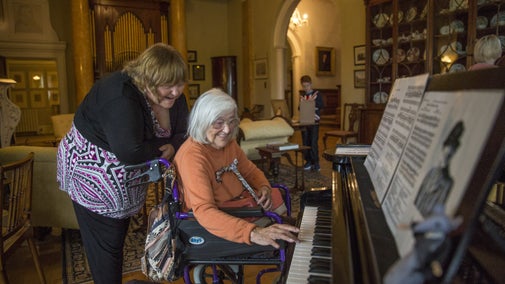
Visiting Killerton with your dog
Killerton is a two pawprint rated place. With miles of paths and tracks to explore, dogs love walkies at Killerton. Find out the best dog-friendly walking routes and where they can run off the lead.
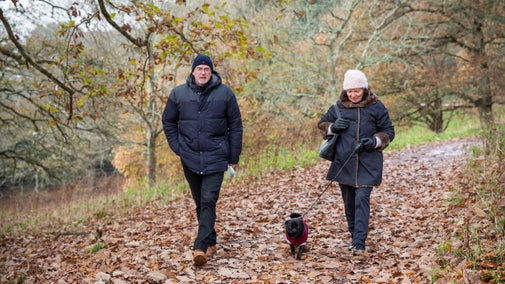
Family-friendly things to do at Killerton
Explore the garden, woods and parkland at Killerton. With an estate that covers 6,400 acres, you'll find fun and adventures for children of all ages.
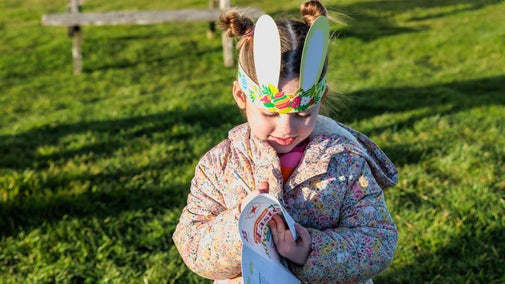
Highlights
House
A friendly Georgian house, once home to generations of the Acland family. Explore the ground floor of the bustling family home as it looked in the 1920s/30s.
Fashion Exhibition
The fashion exhibition is displayed first-floor of the house. For 2026 we bring you 'History off the Hanger'. Three hundred years of hidden histories from the wardrobe.
Chapel
A Grade I listed chapel, built in 1841. Phase 1 of the Chapel restoration project is now complete, with the exterior and beautiful stained glass rose window restored to its former glory - as seen in BBC's Hidden Treasures of the National Trust.
Garden
A garden of historic significance, famous for its collection of shrubs and specimen trees. Discover the Lady Cott (Bear's hut) and ornamental dairy; curious thatched buildings nestled between the trees.
Parkland
Historic parkland with extensive woodland and an ancient Iron Age fort.
Play areas
One for younger children, with a slide, behind the Stables courtyard. Another with swings, in a leafy hideaway by the car park.
Eating
Stables Coffee Shop (dog friendly) serves drinks, cakes, light lunches and snacks. The Killerton Kitchen Cafe opens with the house daily 11am to 4pm, offering a slightly wider menu overlooking the formal gardens (assistance dogs only).
Shopping
Shop in the original stables selling gifts, homeware and plants. Second-hand Bookshop.
Spotlight events
The Sunset Series at Killerton
This summer, experience the magic of an open-air performance set against the backdrop of the setting sun at Killerton. From timeless theatre classics to exciting new performances, join us for a series of captivating twilight shows in the picturesque surroundings of the parkland.
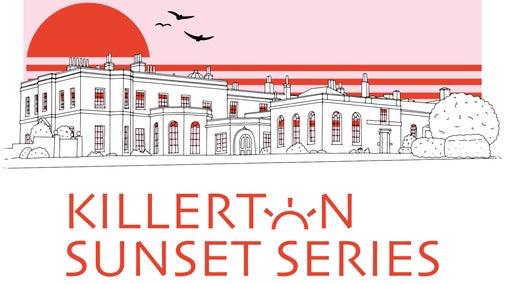
History off the Hanger
This year we are showing clothing featured in the National Trust book, 100 Things to Wear (published September 2025) which includes 10 pieces from Killerton’s collection, including a slipper said to have been worn by King James II.
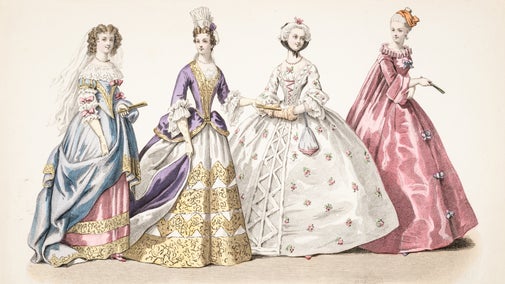
What's on at Killerton
Discover what's coming up at Killerton. From wellbeing walks, Easter trails to painting days, see the events happening at Killerton over the next few months.
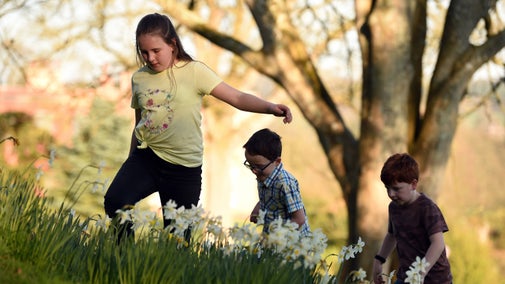
Things to see and do
Things to do in the garden at Killerton
Discover what to see and do in Killerton's diverse garden. There’s plenty of space for walks and adventure at this country estate near Exeter.

Things to do on the estate at Killerton
Explore the forests, orchards and parkland on the vast estate at Killerton and discover the creatures that live here, from Highland cows and dormice to bats and butterflies.

Family-friendly things to do at Killerton
Explore the garden, woods and parkland at Killerton. With an estate that covers 6,400 acres, you'll find fun and adventures for children of all ages.

Eating and shopping at Killerton
Stop by the Stables Coffee Shop for some refreshments, before browsing for gifts and souvenirs in the National Trust shop or second-hand bookshop.
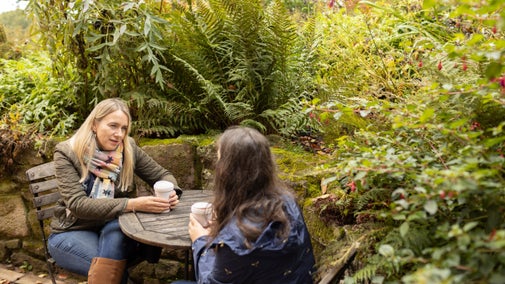
Watch Killerton in Hidden Treasures of the National Trust
Follow the journey of conservation at the places in our care in a new series, Hidden Treasures of the National Trust, broadcast on the BBC. Killerton features in episode 4, where our experts and conservators tell the stories of collections and unusual collectors through the Diana dress and the chapel rose window. You can now watch the episode on BBC iPlayer.

Killerton The Sunset Series
Experience unforgettable summer evenings at Killerton with the Sunset Series, a captivating programme of open air theatre, set with the backdrop of beautiful parkland or the mansion house. As the sun sets, enjoy timeless classics and new productions under the open sky. Bring a picnic, gather your friends and family and soak up the magic of a live performance in a historic setting.

Outdoor activities
Outdoor activities at Killerton
Find out about walking, cycling, orienteering and horse riding at Killerton.

Horse riding at Killerton
Horse riders can explore Killerton, Devon thanks to the miles of permissive bridleways that take in Danes Wood, Killerton Park and Ashclyst Forest.

Top trails
Danes Wood walk
An enchanting walk from the Killerton estate to nearby Danes Wood, a haven for wildlife.

Front Park and The Clump walk at Killerton
During your visit to Killerton, enjoy a circular walk across Front Park and up Dolbury Hill, known locally as The Clump.

Ancient trees walk at Killerton
This circular walk highlights some of the many ancient trees that you can see in the garden and park at Killerton, including sweet chestnuts that were planted some 250 years ago.

Plains walk at Killerton
This dog-friendly walk takes you through one of Killerton's hidden secrets, an enclosed, far-reaching expanse of grassland.

Killerton dog walk
A 2.5-mile circular walk with wide open space where dogs can be on and off the lead while you enjoy far-reaching views and rolling Devon countryside.
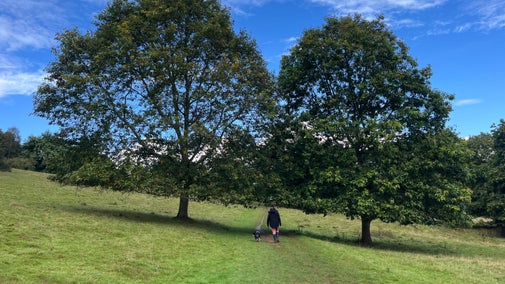
Acland circular walk
This buggy-friendly circular walk follows surfaced paths through the parkland, garden and chapel grounds and is a great introduction to Killerton.

Killerton to Sprydon walk
Enjoy a delightful circular walk from Killerton through orchards, woodland and picturesque thatched cottages at Sprydon.

Deodar Glen walk
This dog-friendly walk follows a 19th-century carriage drive though traditional parkland before finishing with a close up view of the old quarry and extinct volcano.

Eating and shopping
Killerton winter garden walk
A walk of approximately 1 mile (1.6km) on fairly easy terrain, along gravelled footpaths around the chapel and house gardens. Some steep inclines. Optional walk to higher terrain on ungravelled path in the main garden. Rock garden has intricate stepped paths. Dogs must be on short leads.
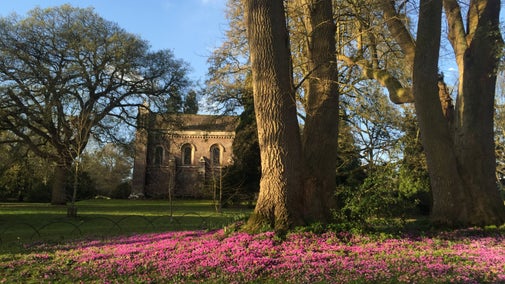
Eating and shopping at Killerton
Stop by the Stables Coffee Shop for some refreshments, before browsing for gifts and souvenirs in the National Trust shop or second-hand bookshop.

Places to stay

Longmeadow Cottage
A thatch cottage with original features and a large garden, on the edge of the great Killerton estate with its 18th-century house, garden and parkland walks.

Crabtree Lodge
A pretty little 1930's inspired cottage on a hill at the heart of the Killerton Estate in Devon with beautiful views towards Ashclyst Forest.

Mattress Cottage
A traditional thatch cottage stay on the border of the Killerton estate.

Crabtree School House
On the wonderful Killerton Estate in Devon, this pretty 1930’s inspired cottage nestles in acres of countryside, looking towards Ashclyst Forest, perfect for escaping the city.

Broad Ley Cottage
A charming thatched cottage complete with open-beam ceilings and an inglenook fireplace.

Killerton Park Cottage
Stay in the parklands of Killerton in this contemporary restored lodge house.

Forest Cottage
A fairy-tale thatch cottage in a magical forest setting.
Upcoming events
History off the Hanger
Killerton's fashion exhibition for 2026 - History off the Hanger, 300 years of hidden stories from the wardrobe.
Free Guided Wellbeing Walk: Deodar Glen Walk
As part of our Wellbeing Walks, join this free walk through parkland to Deodar Glen.
National Lottery Open Week
As a thank you to National Lottery players for supporting our conservation work, we're offering free entry during National Lottery Open Week. Bring your lottery ticket or scratch card and explore Killerton for free.
International Women's Day Wellbeing Walk
To celebrate International Women's Day, join this free circular walk to Danes Wood, in collaboration with North Devon Against Domestic Abuse (NDADA).
Free Guided Wellbeing Walk: Garden and Chapel Walk
As part of our Wellbeing Walks, join this free walk through the garden and chapel grounds.
Easter Adventures at Killerton
Follow the interactive play trail through the grounds and gardens to 'find' Killerton’s Rangers and discover how they make a home for creatures across the estate.
Wander in the Woods - Guided Ranger Walk
Join this free circular walk around the purple route of Ashclyst Forest.
Woodland Flora of Ashclyst Forest - Guided Ranger Walk
Join this free circular walk around the red route of Ashclyst Forest.
About Killerton
Would you give away your family home for your political beliefs? Sir Richard Acland did just that with his Killerton Estate in the heart of Devon, when he passed it on to the Trust in 1944. Today, you'll find a friendly Georgian house set in 2,600 hectares (6,400 acres) of working farmland, woods, parkland, cottages and orchards.
Killerton house is home to the National Trust's biggest fashion collection, with more than 20,000 items of historic clothing and accessories. The core collection was begun by Paulise de Bush before it was first shown at Killerton in 1978. Head to the first floor of the house to immerse yourself in the annually changing fashion exhibition.
There's plenty of calm space in the glorious garden, beautiful year-round with rhododendrons, magnolias, champion trees and formal lawns. You can explore winding paths, climb an extinct volcano, discover an Iron Age hill fort and take in distant views towards Dartmoor.
History
History of Killerton
The Aclands lived at Killerton for almost 300 years and in that time they renovated the house into a Georgian mansion and transformed the garden and estate with exotic plants.

History of The Aclands at Killerton
The Acland family, who passed on the estate to the Trust in 1944, did so for the benefit and enjoyment of everybody. Here's a brief history of the family who called Killerton home.

Art and collections
The collection at Killerton
Discover some of the highlights in the collection at Killerton, from an historic landscape painting to a pair of special wine goblets.

Killerton's fashion collection
Killerton is home to the National Trust’s biggest fashion collection, with more than 20,000 items of historic clothing and accessories, some dating back to the 17th century.

Our work
Our work on the estate at Killerton
Conservation work is a vital part of what the National Trust does at Killerton in Devon. Discover more about our latest initiatives.
Landscape Recovery Project at Killerton
Learn more about Killerton's ‘Three Rivers’ Landscape Recovery Project, where we're aiming to restore nature and the natural landscape, with a focus on improving habitats for the future.
Killerton Chapel Conservation Project
The chapel at Killerton is undergoing extensive conservation work. Follow this exciting project and find out ways that you can support. Help us to ensure that the chapel can be enjoyed by everyone, for ever.
Green recovery at Killerton
Killerton’s estate is an important wildlife haven, but is threatened by climate change. Thanks to the Green Recovery Challenge Fund, projects have been completed to protect its grounds.
Reaching carbon neutral at Killerton
By 2030 the National Trust will be carbon net zero, which is when we achieve a balance between the carbon released into the atmosphere and the carbon removed from it.
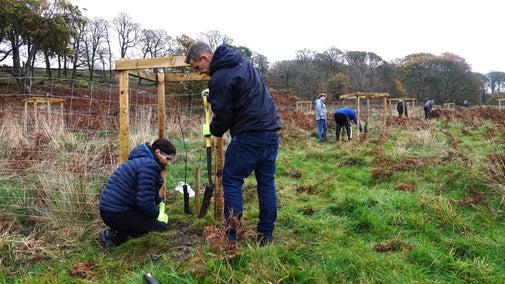
Support us
Volunteering at Killerton
Killerton relies on more than 400 volunteers to carry out conservation work across its house and estate and is looking for more people to join its friendly and dedicated team.
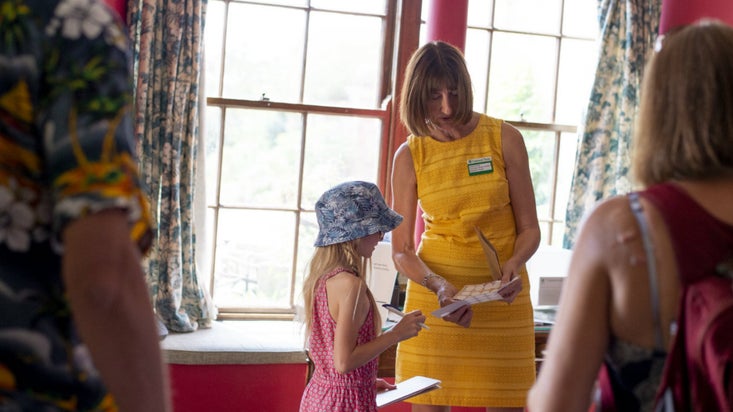
Donate to Killerton
Your gift will help to conserve and protect the house, garden and estate at Killerton for future generations to enjoy.
£25 could plant one established orchard tree.